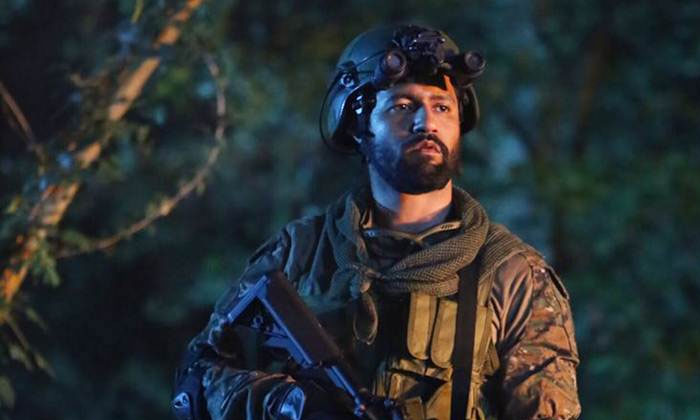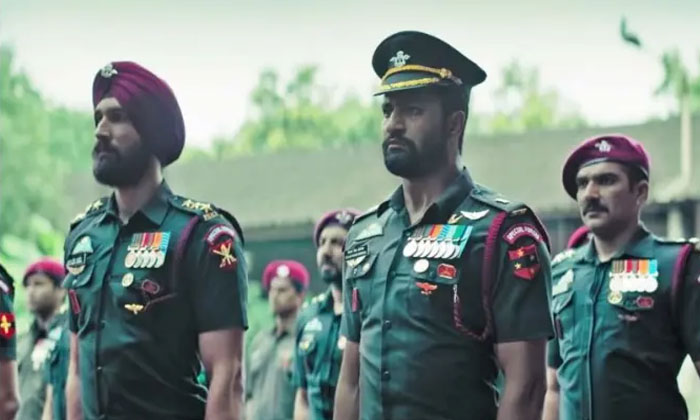Film: Uri
Director: Aditya Dhar
Starring: Vicky Kaushal, Mohit Raina, Paresh Rawal, Yami Gautam

Wars often rage within the soldiers’ hearts, specially when they belong to army families. In one of this significant war film’s highpoints, Major Vihaan Singh Shergill, played by the self-effacing Vicky Kaushal, gathers his troop together somewhere in Kashmir before striking surgically in the country next door (okay, Pakistan. There. I said it). These are soldiers who have lost loved ones in terror attacks, and their blood boils.
“Uri” brings the blood of cross-border tension to a boil but avoids a spillover. There is a rush of patriotic pride in the product — and why should there not be? — but it is reined-in, curbed and never allowed to spill over in a gush of irrepressible jingoism. If you want to see soldiers dancing around a bonfire singing about how much they love their country and how much miss their loved ones, then you’ve got the wrong war film. Yes, these soldiers love their country. But family comes first. And when Vihaan’s brother-in-law (Mohit Raina, making a striking big-screen debut) is killed in a vivid recreation of that real-life murderous attack at the Uri army base, Vihaan channels his personal loss to seek revenge on behalf of the country. It may not be the most patriotic of purposes. But it gives a certain disingenuous believability to the mission.
All through its roomy yet tightly-wound running-time “Uri” confidently gives us people and situations from that golden chapter in BJP’s existence when India voluntarily forefeited the politics of pacifism to take on the enemy headlong. The narrative is stylish and the political figures, from a dapper Narendra Modi (played with a refreshing absence of mimicry by Rajit Kapoor) to a droll Rakesh Bedi (playing a belching Pakistani politician), are all people whom we instantly recognize, not only by the way they look and talk but by their propensity to push the narrative into top gear without toppling the narrative into an excessively zealous jingoism. While the actors playing Indian soldiers are uniformly (pun intended) credible, the film’s technical polish may come as bit of a surprise to those of us who have resigned ourselves to substandard VFX in our cinema. “Uri” is shot with astounding finesse by cinematographer Mitesh Mirchandani.

Every frame is a thoughtful recreation of the moment in time when in 2016, Indian soldiers pushed their way into Pakistan-occupied Kashmir to seek revenge. There is no pitching for effect. The drama and the fury flow organically. Revenge served cold is said to be effective. Writer-director Aditya Dhar serves it up piping hot. The locations and the gunfire exchanges are perhaps the best we’ve seen in Indian cinema. The sound-design and background score capture the pain of lost human lives without bleeding out a banshee of road signs for our emotional responses. The tone of narration avoids overstatement. Dhar avoids the temptation of self-congratulation. Barring a dialogue like, ‘Ghar mein ghus ke marunga’ which doesn’t really belong to this film of graceful comeuppance, there is little chest-thumping here. The performances add considerable weight to the drama. While Kaushal surrenders to his character’s conflicts without intellectualizing them, I must make a special mention of the underused Kirti Kulhari who plays a small enigmatic part as the daughter of a disgraced army officer waiting to redeem her family pride — almost like the war genre in Indian cinema that had gone from Chetan Anand’s “Haqeeqat” and J.P. Dutta’s “Border” to Dutta’s “Paltan”.
“Uri” is a work of many achievements. But to me, a film about national pride without a single shot of the Indian flag is the biggest miracle since the invention of the motionpicture camera. This is a glorious beginning to 2019. And if patriotism is the flavour of the year, bring it on, provided it’s not about Paki-bashing. Just getting even.
IANS













